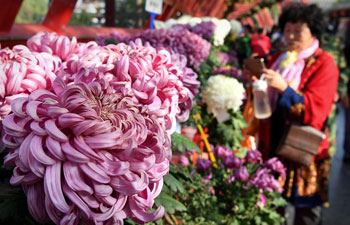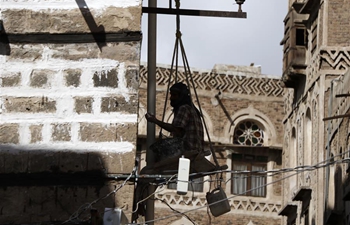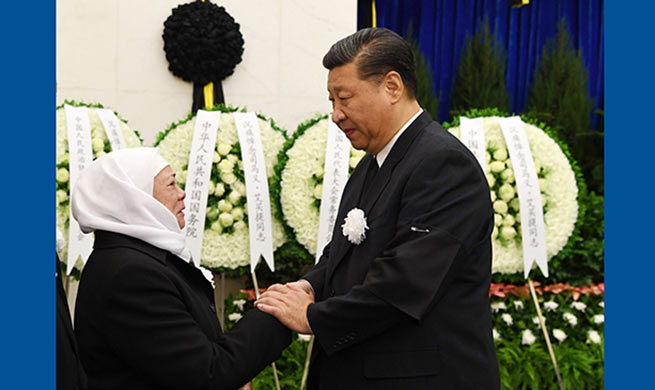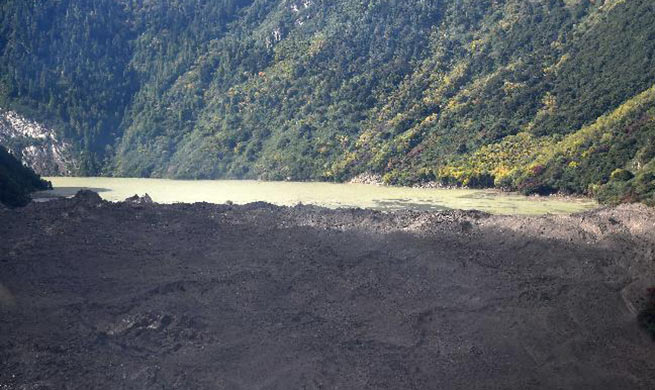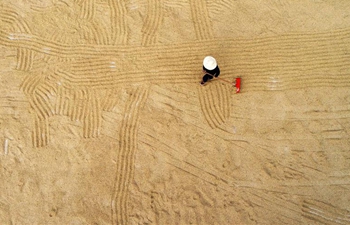by Dana Halawi
BEIRUT, Oct. 18 (Xinhua) -- For many who lived in Hamra during the 1960s and 1970s, the street was the hub of all activities in Lebanon.
People would be seen at cafes, restaurants, clothing stores and theaters, eating, shopping or simply walking through the streets. It was vibrant and full of life.
Hamra Street was referred to as Beirut's "Champs Elysees" as it was frequented by tourists all year round.
Unfortunately, things have tremendously changed lately.
The area is still full of shops, many either free of customers or vacant with "for sale" or "for rent" signs.
The economic slowdown in Lebanon has left many shop owners in Hamra with no choices but either to shut down their businesses or lower prices.
"Retail activity has dropped by around 70 percent compared with previous years," said a clothing shop owner who refused to reveal his name.
"We cannot even cover our expenses for the time being," he told Xinhua, adding that if the situation remains the same, he will have to shut down his store.
Walid, the manager of Dada, a famous clothing shop in Hamra, said that activity is very slow even with the 70-percent discounts.
Walid said his business was highly impacted by the absence of tourists from the Gulf.
"What keeps us going for the time being is that we have very cheap rent fees. Otherwise we wouldn't have been able to stay in the market," he said.
Another shop owner who spoke on condition of anonymity said he paid around 250,000 U.S. dollars for his shop's decoration, yet he cannot sell his products at all.
"As you can see half of the shops in Hamra have closed and 90 percent cannot pay their rent fees," he told Xinhua.
Youssef Nahle, manager of another clothing and accessories shop, said people prefer to buy food nowadays rather than clothes and luxurious items.
"The purchasing power has dropped remarkably," he said.
According to an index prepared by Byblos Bank and the American University of Beirut to measure consumer confidence, the first half of 2018 saw a drop of 31 percent from the semi-annual peak registered in the first half of 2009.
It added that around 60 percent of respondents in the first half of 2018 believed their financial situation will deteriorate in the coming six months.
Adnan Rammal, representative of the trade sector in the Economic and Social Council, said that retail is the sector mostly impacted by the economic slowdown in Lebanon.
He attributed the slow activity in the retail sector to the absence of a government in Lebanon.
"People do not have confidence in the country and they do not feel stable for them to spend their money easily," he said.
Rammal explained that the government is currently spending money on the public sector's salaries mostly and not on investment projects which is one reason behind the drop in trade activity and the slowdown in different retail sectors.
"When the government spends on investment projects, all retail sectors get impacted positively because money is spent in all sectors automatically," he said. "Unfortunately, this is not the case today."
Another reason, according to Rammal, is that the retail sector is not subsidized like other sectors in the country.
"For instance, if you want to start a tourism or agriculture project, you can get a loan for an interest rate of one percent only. However, if you want to work in trade, you get a loan with a higher interest of minimum six percent," he said.
Rammal attributed the slowdown in the retail sector also to high interest rates offered by banks on deposits.
"Banks are giving around 15-percent interest rate on deposits which encourage people to save their money at banks instead of spending them on projects or purchases," he said.
Meanwhile, Nassib Ghobril, head of Economic Research and Analysis at Byblos Bank, attributed the slowdown in the retail sector to the increase in taxes by the government to finance the increase in wages of public employees.
He added that the government increased value added tax from 10 to 11 percent, as well as taxes on corporate profits, which reduced liquidity in the market.
"So, it is normal to see that citizens will not spend money like before since their purchasing power has dropped, while companies will naturally not reinvest anymore or expand their businesses," he said.






